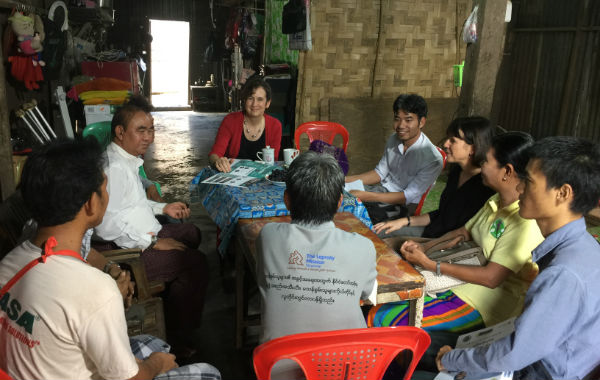
In March 2019 I wrote about the joy of receiving an invitation from an ex-mentor who runs the Myanmar Centre for Responsible Business.
Opportunities to experience a new culture, meet new people and learn are precious. They can sow vital seeds for the future. The trip to Myanmar was no exception. I had the chance to meet well over 200 people directly and indirectly through taking part in a conference, talking at an International Women’s Day event and meeting several disabled people’s organisations, a funding body and a good practice employer.
As a profoundly deaf person I need support for face-to-face conversations with people I don’t know well. So, of course, I needed support to make this trip. I use lipspeakers. Lipspeakers silently repeat English in a clear, lipreadable way, adding gestures, fingerspelling and some elements of sign language to give full access. The cost of this support has sometimes put me at the sharp end, especially at a time when the financial context has been bleaker.
I am sure I am not alone among deaf and disabled people that I regularly have to fight feelings of guilt about the resources my support demands.
It is so easy for those guilty feelings to be overwhelming and to make us feel like a burden, even when we know that the contribution we make is valuable. And it can be easier, especially with a newly acquired disability, to ‘pretend’ that we don’t have these needs to ‘cope somehow’. I have met several people who did this; they didn’t want to ‘be a nuisance’. But this can not only put us and our health at substantial risk, it also means we will not be able to make the best use of our skills and ability, as our resources will be diverted into ‘coping’ with the mechanics of our disability or deafness. And a further negative effect of this can be our non-disabled colleagues getting the impression that we are not up to the job.
Because I used to work for the Foreign and Commonwealth Office, my toughest experiences have been linked to work abroad. Lipspeakers are not a global phenomenon so there is a real cost consideration in ‘exporting’ UK lipspeakers to provide specialist support when travelling for work. That is why I approached my application to Access to Work with some trepidation. I fought back old feelings rooted in the discrimination I had experienced from my previous employer. I describe the experience in a blog on my personal website. In short, the process and communication was very poor. Having left it until the day before my travel to announce only 50% of the cost requested would be covered, they then reduced this on the final day of the trip itself to 20%. It left me feeling very vulnerable.
In such situations the process is important. And when the process is unclear, we can feel seriously disempowered.
So what can you do?
One answer is (always) nothing. Live with it and don’t take those opportunities. Play safe.
But if your instinct tells you that it is better to challenge, ask yourself if you are willing to put in the time to doing this.
Here is how I approached this:
- First let the feelings out with people you trust. Get rid of the emotions safely. (If you are interested, Steve Peters’ The Chimp Paradox explains clearly how the different areas of our brain work and why this ‘offloading’ is necessary).
- Accept that there will be reasons why things happened as they did, that these are not personal and that you may not be able to change anything.
- Decide what you need to happen and set it down clearly.
- Assertively and politely find out who can make this happen.
- Work out who could support you and tell them the factual account of events.
- Be patient, polite and assertive.
I am happy to say that since the events described in my blog, Access to Work has listened to my concerns and is engaging constructively. A new advisor has been assigned to the Myanmar application retrospectively and acknowledgement has been made of poor communication. A big part of my reason for choosing to challenge the process I experienced was concern about how others may feel in a similar situation – and wanting to help avoid this. I hope that I may have made a small difference. But the main thing is that I tried.
If you are facing a similar situation and decide to do something about it – good luck. And if you need support for a difficult decision, or are feeling under pressure, it could be worth considering some coaching.
Find out more about Result CIC's coaching here.